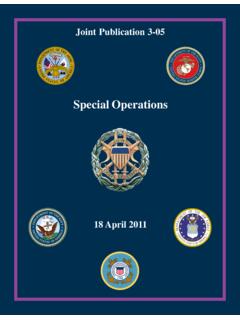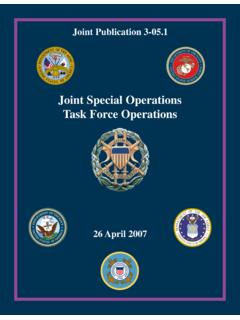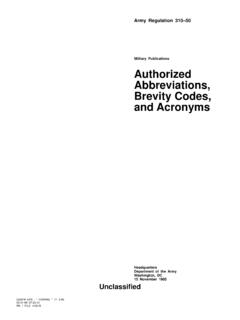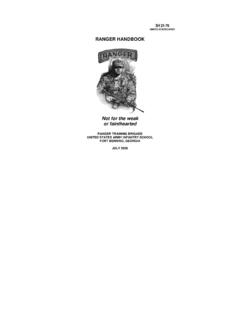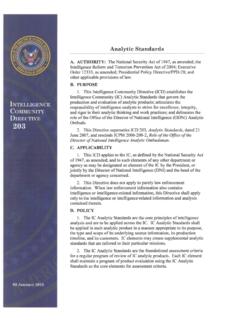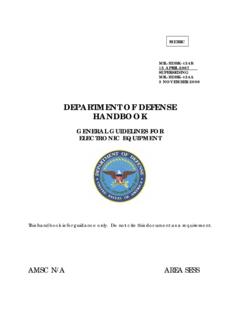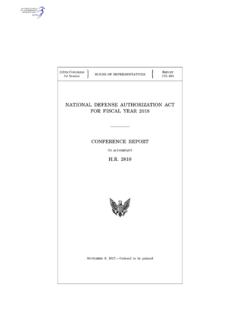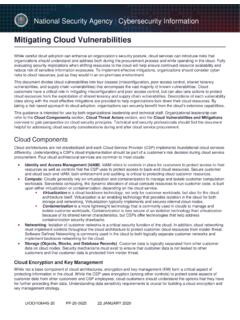Transcription of OFFENSE AND DEFENSE - Federation of American Scientists
1 ADP 3-90 OFFENSE AND DEFENSEJULY 2019 DISTRIBUTION RESTRICTION:Approved for public release; distribution is publication supersedes ADP 3-90, dated 13 August , DEPARTMENT OF THE ARMY This publication is available at the Army Publishing Directorate site ( ) and the Central Army Registry site ( ). *ADP 3-90 DISTRIBUTION RESTRICTION: Approved for public release; distribution is unlimited. *This publication supersedes ADP 3-90, dated 13 August 2018. i Army Doctrine Publication No. 3-90 Headquarters Department of the Army Washington, DC, 31 July 2019 OFFENSE AND DEFENSE Contents Page iii INTRODUCTION .. v Chapter 1 TACTICAL 1-1 Tactics .. 1-1 The Tactical Level of 1-1 The Art and Science of Tactics .. 1-2 Solving Tactical Problems .. 1-4 Hasty Versus Deliberate Operations.
2 1-5 Risk .. 1-6 Chapter 2 COMMON TACTICAL CONCEPTS AND ECHELONS .. 2-1 Joint Interdependence .. 2-1 Principles of Joint Operations .. 2-1 Operational Variables .. 2-1 Mission Variables .. 2-2 The Army s Tactical Doctrinal Taxonomy .. 2-2 Warfighting Functions .. 2-2 Defeat Mechanisms .. 2-4 Basic Tactical Concepts .. 2-4 Forms of Maneuver and Forms of the 2-17 Echelons .. 2-17 Chapter 3 THE OFFENSE .. 3-1 Purposes of the OFFENSE .. 3-1 Characteristics of the OFFENSE .. 3-1 Types of Offensive Operations .. 3-3 Common Offensive Control Measures .. 3-3 Common Offensive Planning Considerations .. 3-7 Transition .. 3-18 Chapter 4 THE DEFENSE .. 4-1 Purposes of the DEFENSE .. 4-1 Characteristics of the DEFENSE .. 4-1 Types of Defensive Operations .. 4-3 Common Defensive Control Measures.
3 4-4 Common Defensive Planning Considerations .. 4-7 Transition .. 4-18 Contents ii ADP 3-90 31 July 2019 Chapter 5 ENABLING OPERATIONS .. 5-1 Reconnaissance .. 5-1 Security 5-2 Troop Movement .. 5-3 Relief in Place .. 5-4 Passage of Lines .. 5-4 GLOSSARY .. Glossary-1 REFERENCES .. References-1 INDEX .. Index-1 Figures Figure 1-1. Risk reduction factors .. 1-7 Figure 2-1. Taxonomy of Army tactics .. 2-3 Figure 2-2. Division-assigned airspace .. 2-9 Figure 2-3. Flanks of a stationary unit .. 2-12 Figure 2-4. Flanks of a moving unit .. 2-13 Figure 4-1. Defensive arrangement .. 4-6 Tables Introductory table. New and modified Army terms .. vi 31 July 2019 ADP 3-90 iii Preface ADP 3-90 augments the land operations doctrine established in ADP 3-0 and FM 3-0. It provides additional information on the basic concepts and control measures associated with the art and science of tactics.
4 ADP 3-90 provides the doctrine for the conduct of offensive and defensive operations, just as ADP 3-07 provides doctrine for the conduct of stability operations, and ADP 3-28 provides the doctrine for the DEFENSE support of civil authorities tasks. ADP 3-90 focuses on the organization of forces; minimum-essential control measures; and general planning, preparation, and execution considerations for offensive and defensive operations. It is the common reference for all students of the art and science of tactics. Echelon-specific Army techniques publications address how each tactical echelon employs these tactical concepts. The principal audience for ADP 3-90 is all members of the profession of arms. Commanders and staffs of Army headquarters serving as a joint task force or multinational headquarters should also refer to applicable joint or multinational doctrine concerning the range of military operations.
5 Trainers and educators throughout the Army use this publication. Commanders, staffs, and subordinates ensure their decisions and actions comply with applicable , international, and, in some cases, host-nation laws and regulations. Commanders at all levels ensure their Soldiers and Department of the Army Civilians operate in accordance with the law of war and the rules of engagement. (See FM 27-10.) ADP 3-90 uses joint terms where applicable. Selected joint and Army terms and definitions appear in both the glossary and the text. Terms for which ADP 3-90 is the proponent publication (the authority) are marked with an asterisk (*) in the glossary. When first defined in the text, terms for which ADP 3-90 is the proponent publication are boldfaced and italicized, and definitions are boldfaced.
6 When first defining other proponent definitions in the text, the term is italicized and the number of the proponent publication follows the definition. Following uses of the term are not italicized. ADP 3-90 applies to the Active Army, Army National Guard/Army National Guard of the United States, and United States Army Reserve unless otherwise stated. The proponent of ADP 3-90 is the United States Army Combined Arms Center. The preparing agency is the Combined Arms Doctrine Directorate, Army Combined Arms Center. Send comments and recommendations on a DA Form 2028 (Recommended Changes to Publications and Blank Forms) to Commander, Army Combined Arms Center and Fort Leavenworth, ATTN: ATZL-MCD (ADP 3-90), 300 McPherson Avenue, Fort Leavenworth, KS 66027-2337; by email to or submit an electronic DA Form 2028.
7 This page intentionally left blank. 31 July 2019 ADP 3-90 v Introduction ADP 3-90, OFFENSE and DEFENSE , articulates how Army forces conduct the OFFENSE and DEFENSE . It contains the fundamental tactics related to the execution of these elements of decisive action. Tactics employs, orders arrangement of, and directs actions of forces in relation to each other. Commanders select tactics that place their forces in positions of relative advantage. The selected tactics support the attainment of goals. Tactics create multiple dilemmas for an enemy allowing the friendly commander to defeat the enemy in detail. Successful tactics require synchronizing all the elements of combat power. ADP 3-90 is the introductory reference for all Army professionals studying the art and science of tactics.
8 The five chapters of ADP 3-90 focus on the tactics used to employ available means to prevail during large-scale ground combat (in the OFFENSE and the DEFENSE ), and they constitute the Army s collective view of how it conducts prompt and sustained tactical offensive and defensive operations on land. All tactics require judgment in application. This publication is not prescriptive, but it is authoritative. ADP 3-90 standardizes the lexicon commanders use to describe the conduct of offensive, defensive, and supporting enabling operations. It focuses on the employment of combined arms in combat operations. ADP 3-90 has five chapters. Chapter 1 introduces the art and science of tactics. The key points contained within chapter 1 include An opponent is always thinking and seeking ways to prevail.
9 Some of those ways may be considered out-of-bounds by the and unified action partner forces. A force is always in some form of contact. Mastering the art and science of tactics requires constant study and training. Doctrine provides a set of tools that leaders adapt to meet the needs and conditions associated with their specific situations. Chapter 2 defines basic tactical concepts and echelons associated with the conduct of both the OFFENSE and DEFENSE . It illustrates the doctrinal taxonomy established in ADP 3-0. That doctrinal taxonomy is the basis for the organization of chapters 3 through 5. Chapter 2 also defines echelons from the fire team to the field army. Chapter 3 provides the basics of the OFFENSE . It discusses the purposes and characteristics of the OFFENSE .
10 It defines the four types of offensive operations. It addresses common offensive control measures and discusses common offensive planning considerations by warfighting function. The chapter closes with a discussion of transitions to either defensive or stability operations. Chapter 4 provides the basics of the DEFENSE . It discusses the purposes and characteristics of the DEFENSE . It defines the three types of defensive operations. It addresses common defensive control measures and then discusses common defensive planning considerations by warfighting function. The chapter closes with a discussion of transitions to offensive or stability operations. Chapter 5 addresses those enabling operations that are not the subject of their own publications. Commanders conduct enabling operations as shaping or supporting efforts during decisive action, but they are not primarily offensive, defensive, and stability operations, or DEFENSE support of civil authorities tasks.
